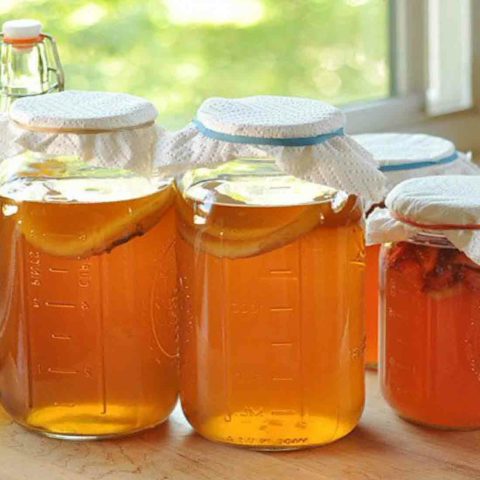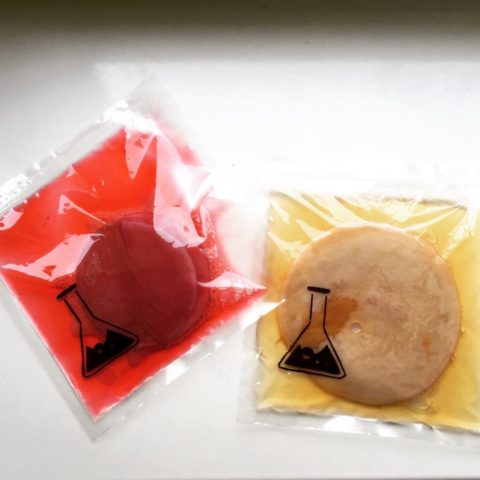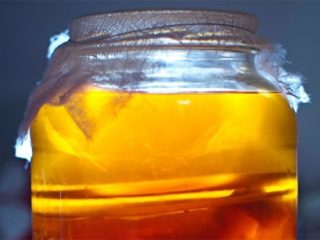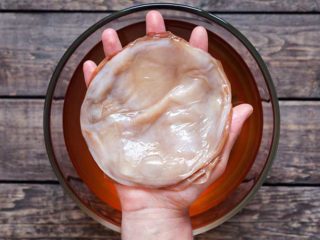Content
Store the kombucha properly if you need a break. After all, a strange-looking gelatinous substance is living, it is a symbiosis of two microorganisms - acetic acid bacteria and yeast. When added to the nutrient solution from the weak tea and sugar, it converts the liquid into a soft drink called kombucha.
This tasty infusion with many medicinal properties is especially pleasant in summer. In winter, most people prefer hot drinks. In addition, you cannot constantly use kombucha - they take a break every 2-3 months. And people tend to go on vacation and guests. There can be many reasons for the suspension of kombucha production, and the issue of storing kombucha for a long time becomes urgent.

With a prolonged absence of the owners, the question of the safety of the kombucha becomes urgent.
How to store kombucha at home
Usually, the infusion is prepared in a three-liter jar, pouring 2 liters of nutrient solution. The same amount of drink is obtained at the exit. Since the process is continuous, every 5-10 days, 2 liters of kombucha appear in the house.
For some families, this amount is not enough, and they insist several containers of kombucha at once.
Some people specifically do not drink the infusion of jellyfish immediately. They bottle the drink, seal it, and leave it to “ripen” in a dark, cool place, like wine. The yeast bacteria continue to work, and the alcohol level rises in the kombucha.
Here it is important to ensure that the kombucha does not ferment, otherwise it will turn into vinegar. And it is good to think over a way to seal containers, since the produced carbon dioxide is capable of tearing off a poorly fitted lid. Usually, with additional infusion at room temperature, it is limited to 5 days.
They do not leave kombucha in a jar with kombucha, because the acid produced can damage the body of the medusomycete (the scientific name of the symbiont). It is difficult to determine the moment when the solution turns from a nutrient into a dangerous one for a colony of microorganisms. Therefore, the infusion is filtered and poured into bottles.
How to store ready-made kombucha
Ready-made kombucha does not last long at room temperature. Even if you boil it. But you can put the kombucha in the refrigerator. At the same time, all processes in the drink are greatly slowed down, but do not stop at all. The beneficial properties remain the same, but the acid and alcohol content increases slightly.
Is it possible to store ready-made kombucha in the freezer
If there is a jellyfish at home, it makes no sense to store the finished drink in the freezer. But if you really need it, you can.
Because yeast and vinegar bacteria make the environment aggressive for many materials, it is best to store kombucha in a freezer in glass.To do this, the drink is poured into a container, for example, a liter jar, without filling it to the edge (the liquid expands when freezing), put open in a tray. The usual care will help not to spill the infusion.

It is easier to seal kombuchu under factory conditions than at home.
How much kombucha drink is stored
Kombucha infusion can be stored at home at room temperature for 5 days. In a cool room, at 18 ° C and below, the period slightly increases. But there is a danger that the drink will turn into vinegar. So it is better not to keep it in the room or in the kitchen for more than a week.
If a bottle of kombucha is hermetically sealed, it will last 3-5 months in the refrigerator. We are talking about an impermeable container - a nylon cap, even if it is very firmly attached to the neck, is not suitable. It will explode, and the refrigerator will have to be quickly and thoroughly washed - for rubber gaskets and plastic parts, the infusion is dangerous.
Kombucha kombucha can be stored for up to a month without airtight sealing. Before putting it in the refrigerator, the neck is tied with several layers of clean gauze.
How to store kombucha when not using it
The body of the jellyfish can be stored in a variety of ways. It all depends on how much he should be inactive.
How to store kombucha in the refrigerator
While on vacation, you can store the kombucha directly in the nutrient solution by placing the jar in the refrigerator. The action of microorganisms will slow down, and the medusomycete will safely stand there from 20 to 30 days.
Upon returning, it must be taken out of the refrigerator, allowed to warm up to room temperature in a natural way. Then the medusomycete is washed, filled with a new nutrient solution and placed in its usual place.
How to preserve kombucha during a long absence
If the owners are leaving for a long time, the above method will not work. Kombucha can be kept in the refrigerator immersed in the solution for no more than a month, then it and the jar are washed, and if necessary, put back.
In any case, human intervention is indispensable. Leaving the container with jellyfish at room temperature unattended for a long time is out of the question. Returning owners, most likely, will see something dried up at the bottom of the can, covered with fluffy spores, which, if handled carelessly, scatter in all directions.
Kombucha can be stored for a long time without intervention:
- in the freezer;
- drying the body of the jellyfish.

In this form, kombucha can lie in the freezer for up to six months.
How to keep kombucha until next summer
Young and mature jellyfish, consisting of several plates, work in different ways. This property should be used if long-term storage is required. It is recommended to remove one or two of the top plates, stir in a small amount of normal nutrient solution until they float to the surface. And only then prepare for storage.
How to properly store kombucha in solution
In a weak brewing solution, you can save Kombucha in winter by placing the jar in a cool, dark place. Then the infusion must be drained once every 2 weeks, rinsed with the jellyfish and the container.
It is possible to store kombucha in the refrigerator without hygiene procedures and replacing the solution twice as long - up to a month.
How to dry kombucha
There is a way in which the symbiont does not need to be taken care of at all. It can be dried.To do this, the medusomycete is washed, dipped in a clean cotton napkin (the usual one will stick to the damp surface, and the linen one is too rough). Then put it on a clean plate.
It, in turn, is placed in a deep saucepan or bowl, covered with gauze. This is done in order to protect the surface of the symbiont from debris and midges, without blocking the access of oxygen. Dishes with high edges will allow you not to put gauze directly on the body of the jellyfish.
It is necessary to ensure that the mushroom dries evenly and does not grow moldy. To do this, from time to time, turn it over to the other side, and wipe the remaining moisture from the plate.
The medusomycete will turn into a thin dry plate. It is neatly tucked away in a bag and kept in the vegetable drawer of the refrigerator or kitchen cabinet. Store for a year or longer.
If necessary, the jellyfish is placed in a small volume of nutrient solution, put in its usual place. The first ready-made kombucha is drained, even if it tastes good to someone. The second portion can be used for its intended purpose.
Is it possible to freeze kombucha
The frozen body of the jellyfish can be stored for 3 to 5 months. Kombucha is removed from the nutrient solution, washed, and excess moisture is removed with a soft clean cloth. Put in a bag and put away in the lowest temperature section of the freezer.
Then it can be moved to another tray. It is necessary to freeze kombucha quickly, as small ice crystals form inside and on the surface, which do not violate its structure. The slow one promotes the formation of large pieces that can damage the body of the medusomycete.
When the time comes, the frozen cake is placed in a small volume of room temperature nutrient solution. There, the kombucha will thaw and start working. The first batch of kombucha is poured out. The second is ready for use.

The first portion of kombucha obtained after long-term storage of the medusomycete must be poured
How not to store kombucha
In order for the medusomycete to survive during storage, and subsequently quickly get to work, special efforts will not be required. But the owners manage to make the same mistakes. The most common ones when stored in solution are:
- Leave the kombucha in its usual place, simply forgetting about it.
- Make too concentrated a solution for storage in a jar.
- Do not rinse periodically.
- Block off air access.
- Finished kombucha is not easily corked. Fermentation processes will continue even in the refrigerator, only slowly. Sooner or later, the lid will rip off and the drink will spill.
When drying and freezing, you must not:
- Send kombucha for storage without rinsing first.
- Cool the jellyfish gradually. This is how large pieces of ice are formed that can damage the body of the symbiont.
- Forgetting to turn the mushroom over when drying.
Conclusion
Store the kombucha if you need a break, perhaps in a variety of ways. They are lightweight and effective, you just have to choose the right one and do it right. Then the medusomycete will not suffer, and when the owners want it, it will quickly recover and start working.








